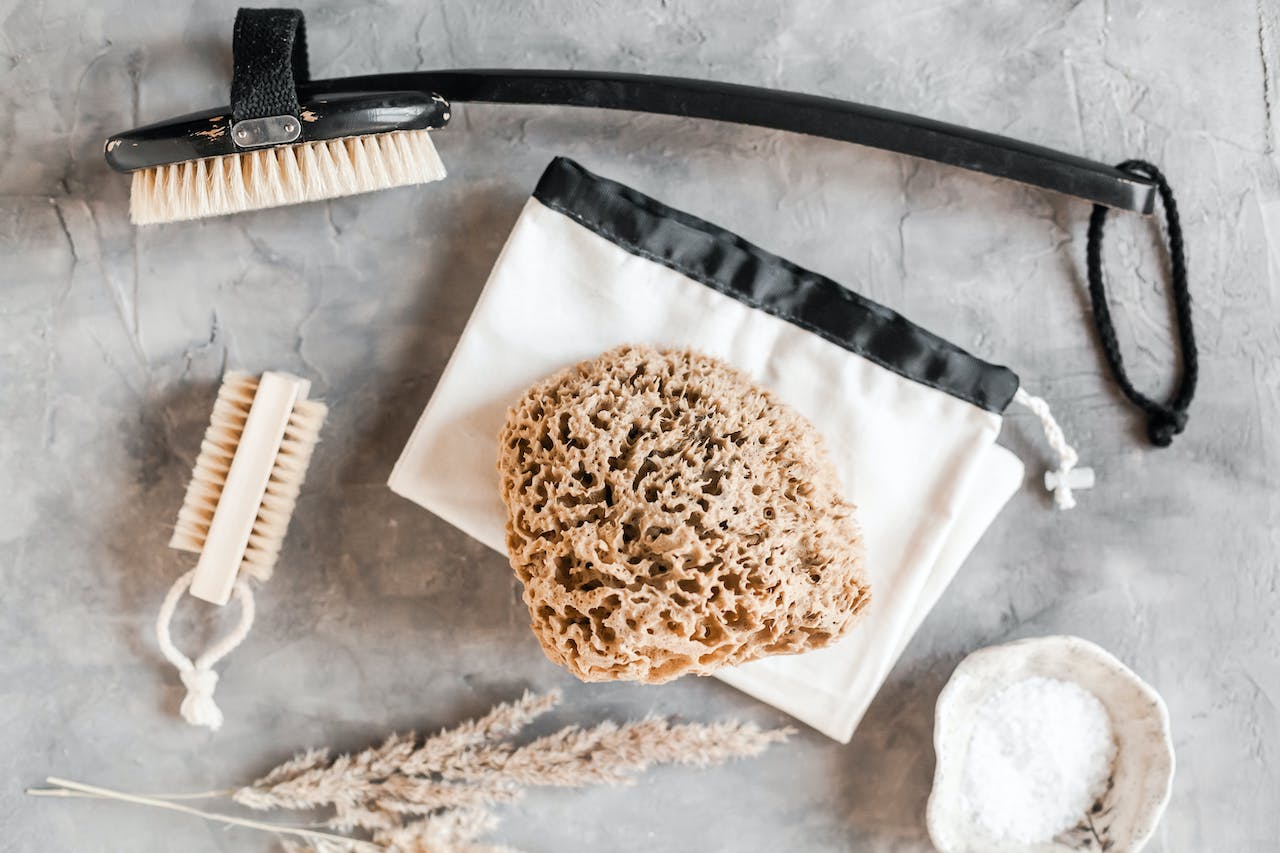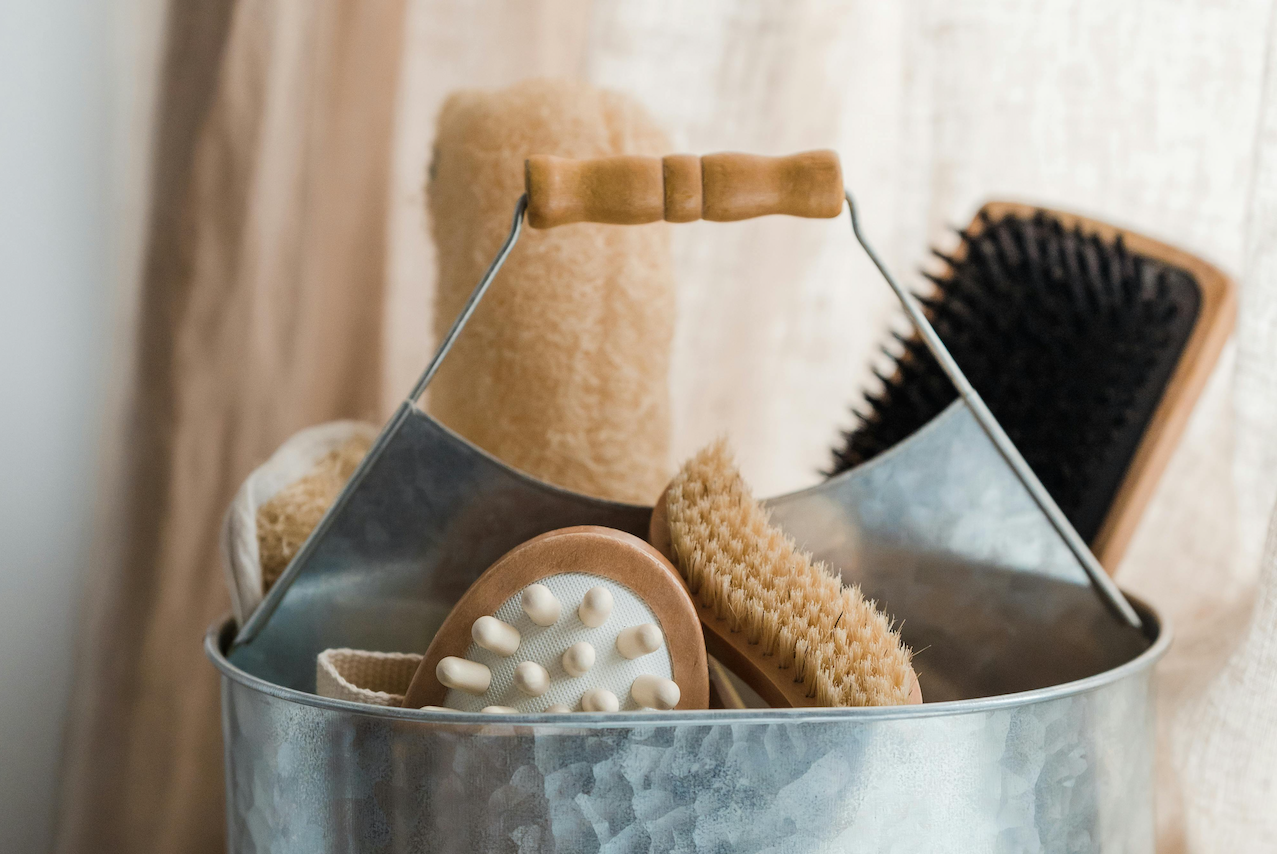- HOME
- Infrared Sauna Benefits
- Best Sauna Drinks
Best Drink for Sauna: What To Drink Before, During & After
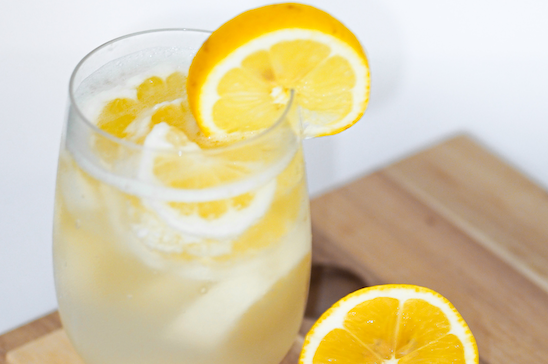
Green tea with aloe vera is refreshing, full of antioxidants, and one of our go-to picks after a sauna. But when it comes to finding the best drink for sauna use, you have plenty of good options. Finding the best drink for sauna hinges on hydration and timing. Drink enough before and during your session to stay ahead of fluid loss.
You are not just losing water when you sweat. Sodium, potassium, and magnesium go too. These electrolytes [1] are essential for fluid balance, muscle function, and nerve activity. If they drop too low, you may feel fatigued or crampy [2].
Below, we break down what to drink before, during, and after your sauna session and why it matters.
Tuning Your Body Before Sauna
Before you start your session, preparing your body helps both body and mind. Whether you use a sauna, a sauna blanket, or a PEMF mat, getting ready sets a good foundation.
Hydration is key. Drinking water is simple and effective. But if you want something tasty, refreshing, and healthy, consider one of these options:
Coconut water
Coconut water is a popular hydration choice. You can buy it or make it fresh at home. Here’s a simple recipe to make fresh coconut water.
Key points about coconut water [3]:
🔹 It’s low in calories and sugar, making it a light, refreshing drink.
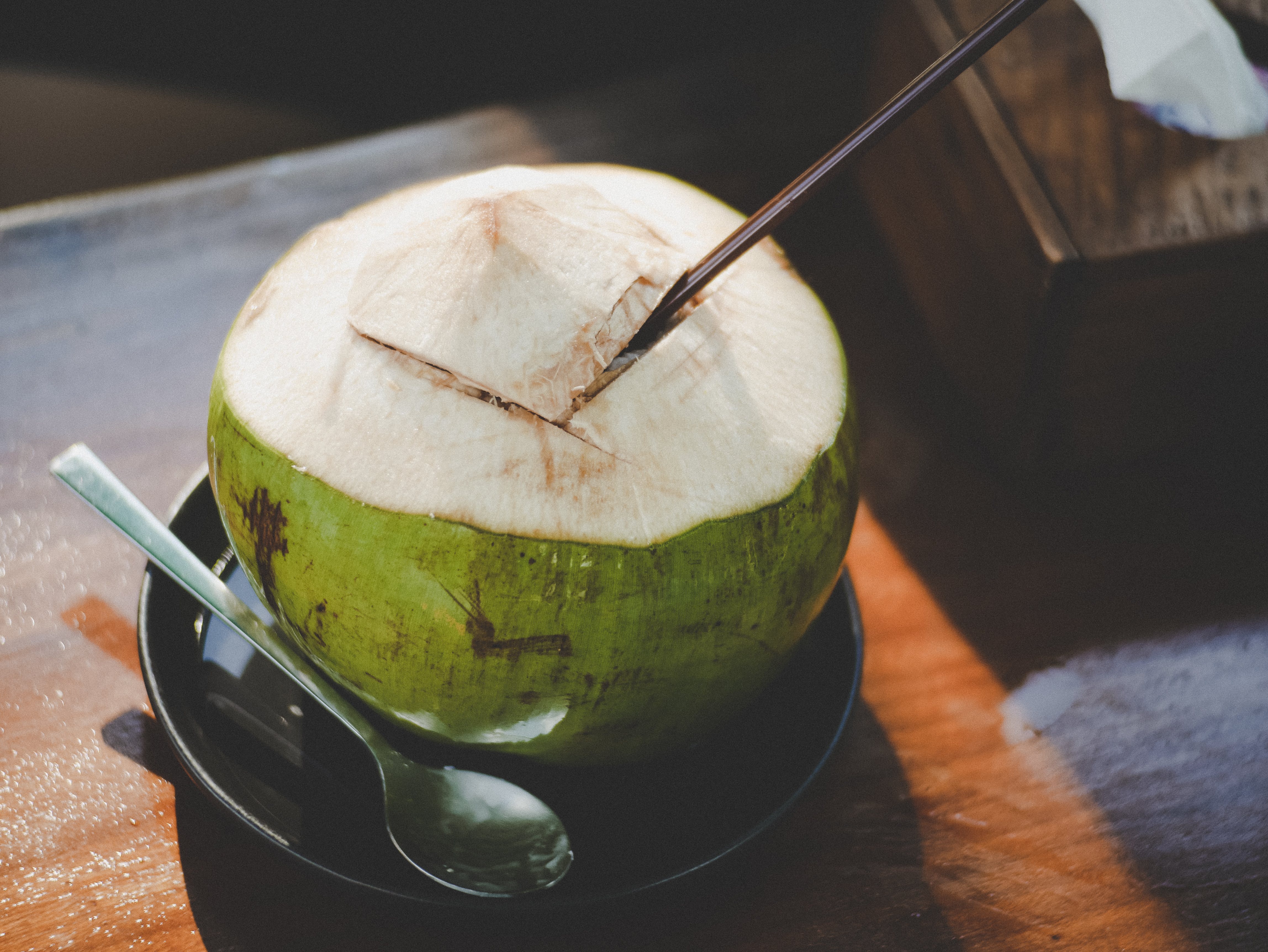
🔹 Coconut water (not to be confused with coconut milk) provides natural electrolytes like potassium, calcium, and magnesium.
🔹 It has more potassium and less sugar than typical sports drinks. Potassium helps muscle function and reduces cramps.
🔹 It usually has less sodium, so heavy sweaters might need extra sodium replacement.
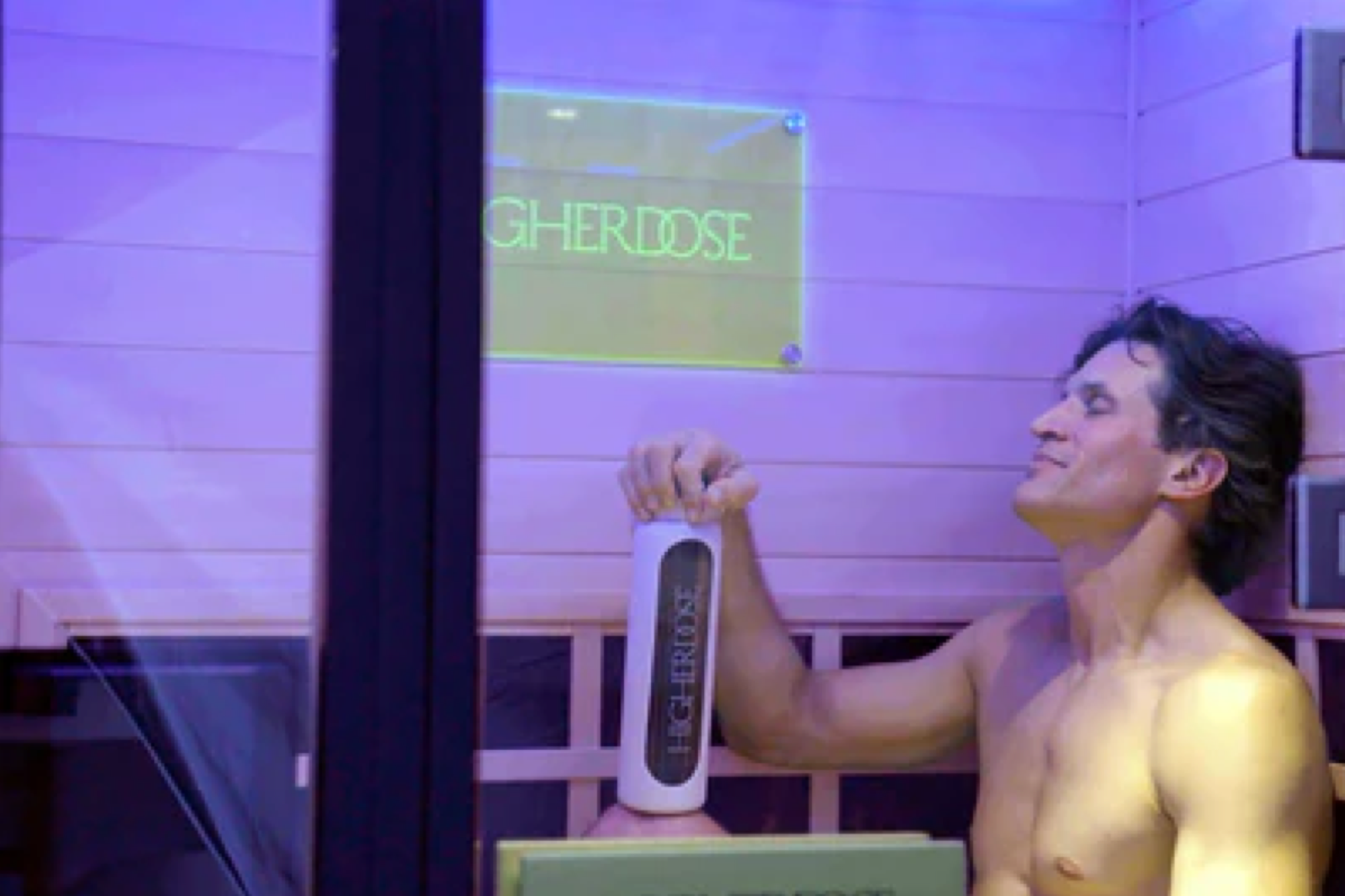
Bring your bottle into the sauna to stay hydrated while you sweat
Golden Turmeric Tonic
Turmeric has curcumin and other compounds linked to anti-inflammatory and antioxidant effects. It might aid heart, liver, and kidney health [4], though more research is needed to confirm specifics. It’s a warm, natural option for sauna sessions. 👉 Try this Golden Turmeric Tonic recipe
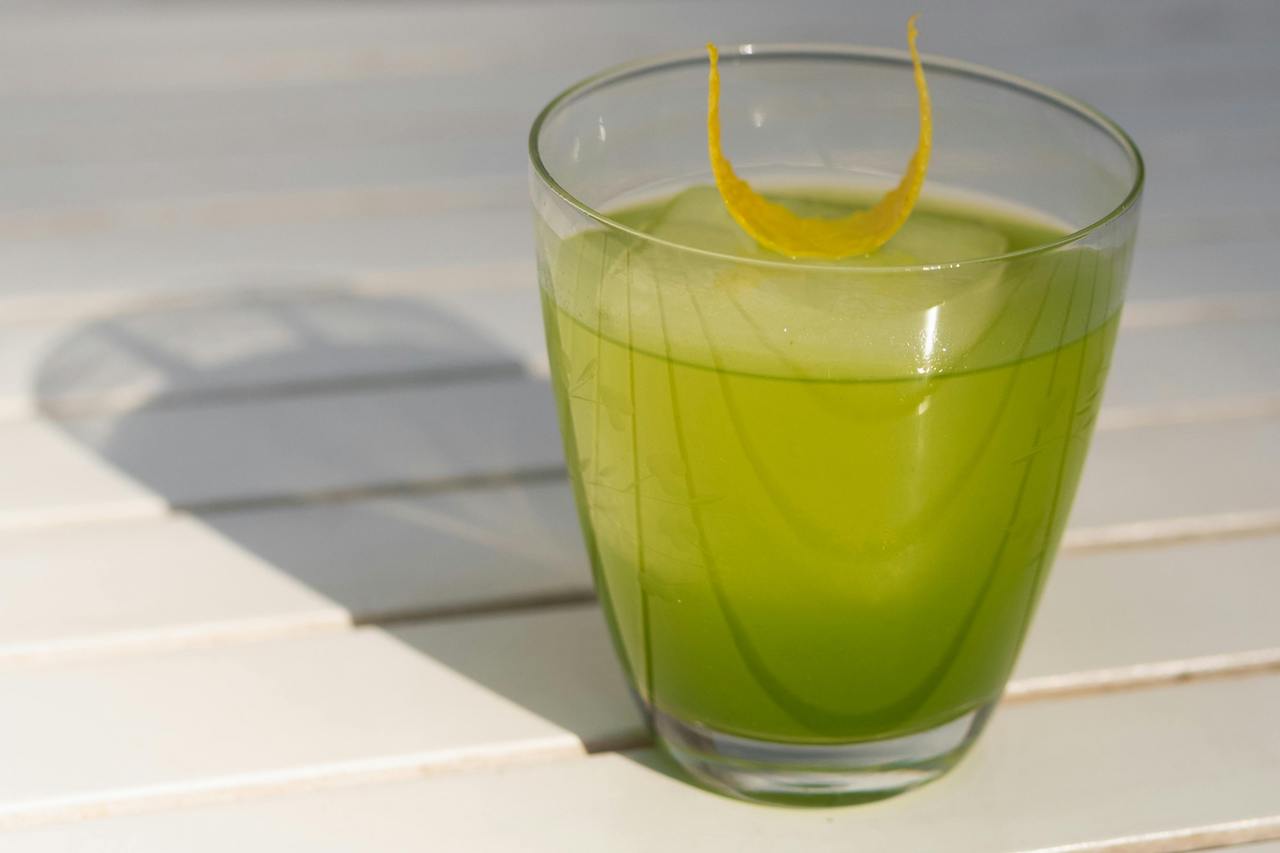
GREEN TEA & ALOE VERA SIPPER
Aloe vera has long been used for digestive health and inflammation management. Studies show that aloe drinks with low aloin levels are safe to drink [5]. Paired with antioxidant-rich green tea, this drink helps get your stomach ready for heat and aids overall wellness. 👉 Green Tea & Aloe Vera Sipper recipe
Light Herbal Teas
Choose one of these herbal teas to start your self-care session. Each provides hydration and specific health benefits:
🔹 Lemongrass tea: Aids fluid balance and digestion. Along with green tea and aloe vera, it delivers antioxidants that protect cells.
🔹 Fennel tea: Supplies electrolytes for hydration and eases digestive discomfort and bloating.
🔹 Chamomile tea: Reduces stress, promotes relaxation and sleep, and has anti-inflammatory effects.
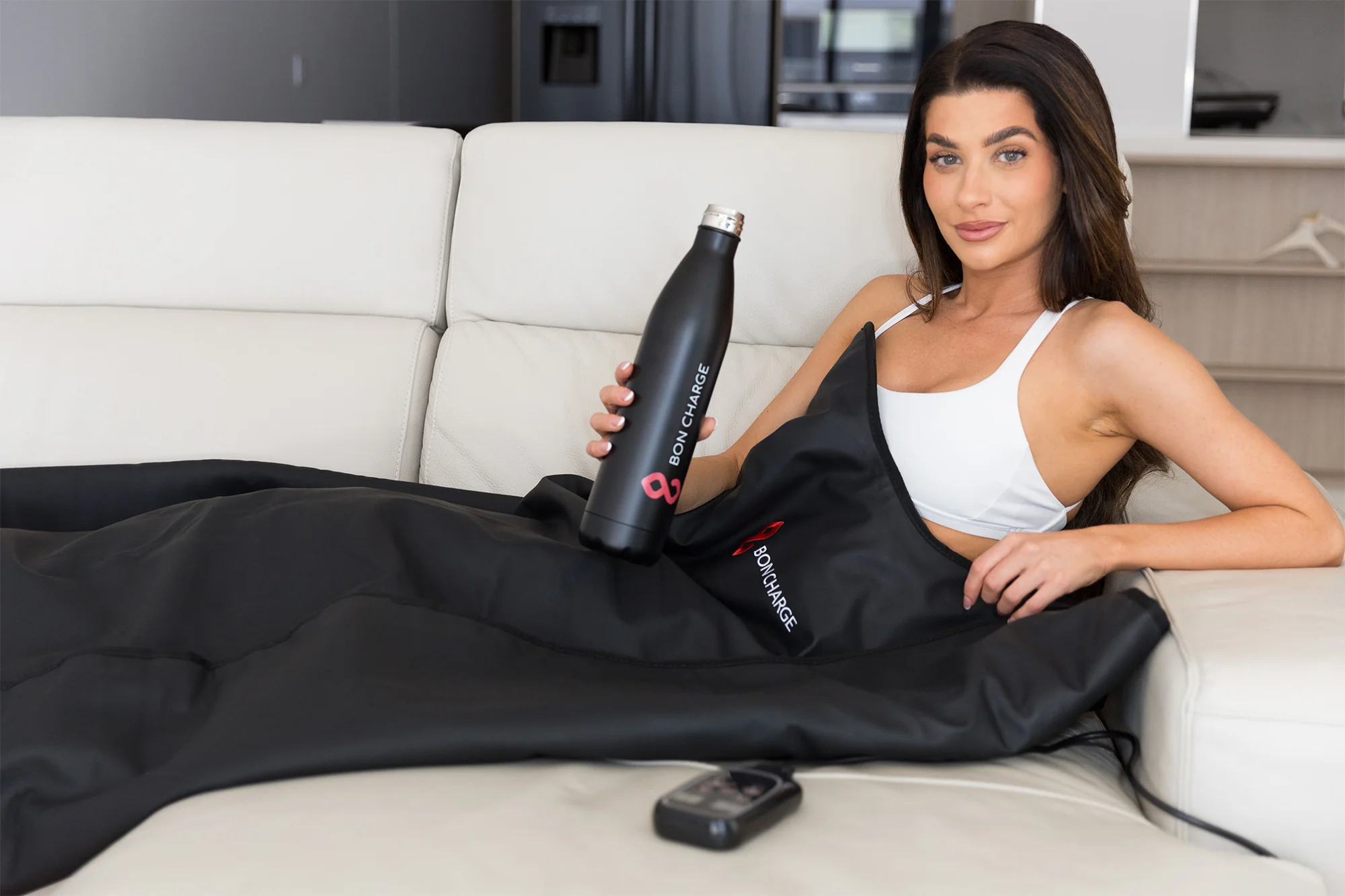
Not just in the sauna. Staying hydrated matters in the sauna blanket too
🔹 Mint tea: Cools the body while easing digestion. Plus, it leaves your breath fresh and clean.
🔹 Ginger tea: Stimulates circulation, warms the body, and eases nausea and digestive issues. It also has anti-inflammatory compounds.
🔹 Rooibos tea: Hydrates without caffeine and delivers antioxidants plus minerals important for bone health.
🔹 Rose Hip tea: Rich in vitamin C, it helps immune function and skin health while adding a tart, floral flavor.
🔹 Peppermint tea: Contains menthol for cooling, aids digestion, eases gas, and lifts mood with its scent.
🔹 Green Tea: Helps metabolism and cell health with antioxidants while providing a mild caffeine lift.
🔹 White Tea: Delivers gentle energy without jitters, promotes heart health, and assists detox through antioxidants.
While personal preference matters, drinks like coconut water and green tea with aloe vera stand out for sauna prep due to their balance of hydration and electrolytes.
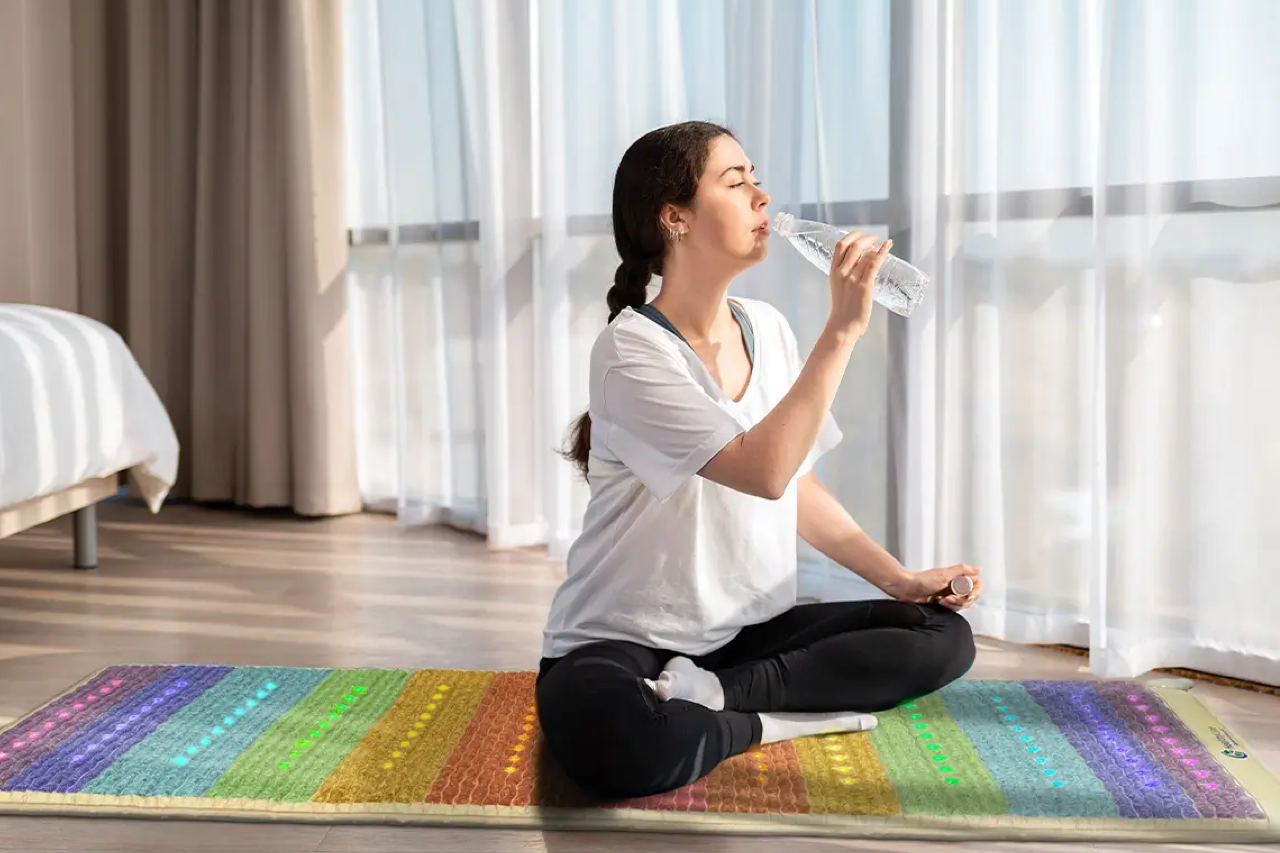
Although an infrared PEMF mat produces less heat, up to 167°F (about 75°C), staying hydrated is still key
Harmony in heat – In the sauna
While in the sauna, water is your best choice. For a quick session with more flavor, try fruit-infused water. It hydrates without the added sugar found in juice or soda.
Fruits like citrus and cucumber release natural electrolytes that replace what you lose through sweat. Sodium from the fruit helps maintain fluid balance, making it a smart pick during heat exposure.
Fruit-infused water is refreshing and light, encouraging you to drink more. As your pores widen and circulation increases, nutrients from the fruit can aid detox and leave your skin feeling soft and refreshed.
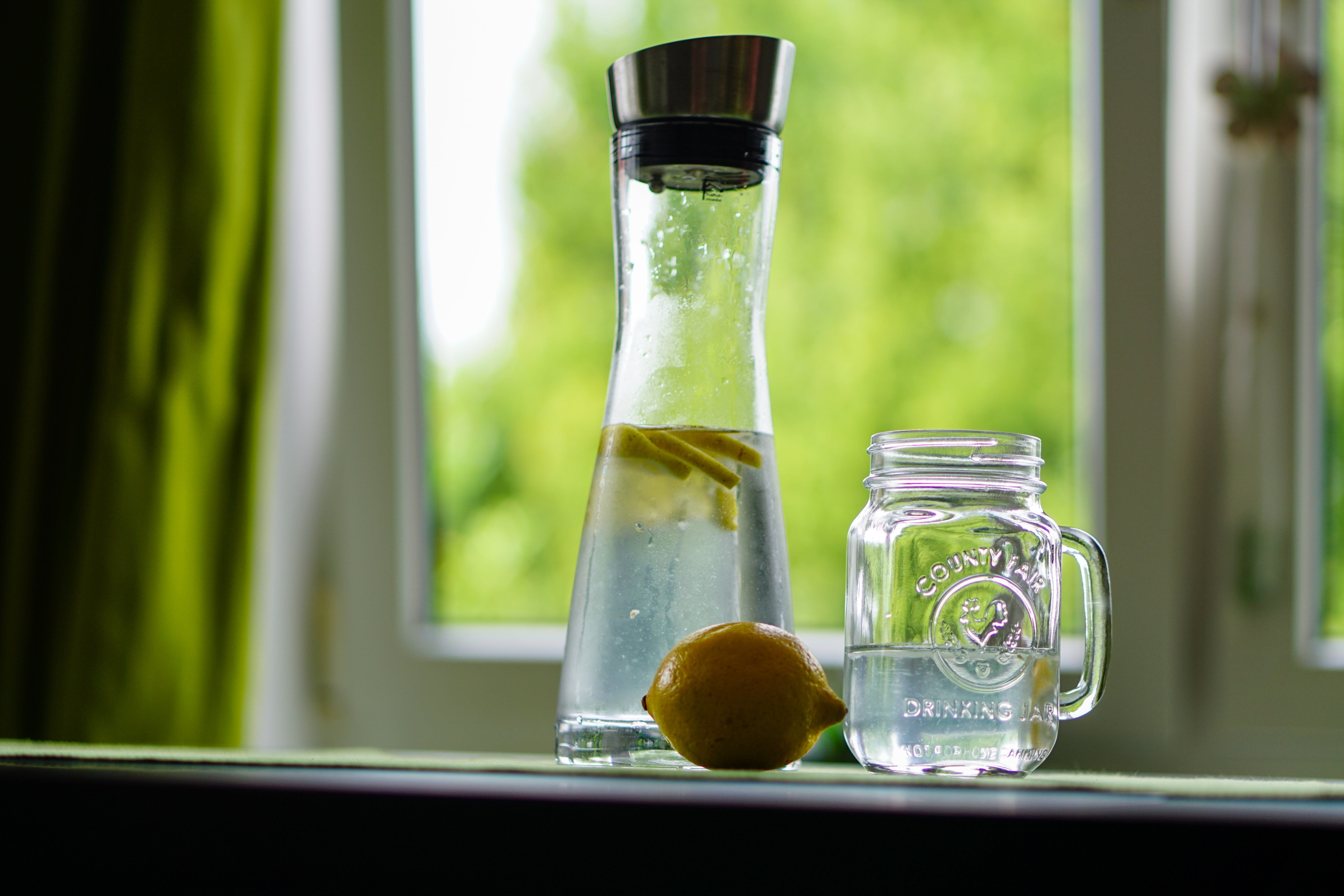
So, sit back and enjoy the glow from your sauna. Sip a refreshing glass of fruit-infused water, or whichever drink you prefer, and let it help with hydration, relaxation, and recovery.
Looking to add more flavor? Check out our infused water recipes for sauna use and bring variety to your sessions.
Staying hydrated during your wellness routine isn’t just about what you drink before, during, and after your sauna or PEMF session. It’s also about choosing the right way to stay hydrated.
During your session, sipping water or an electrolyte drink is key. The right bottle makes all the difference. It should be easy to open, leak-proof, and keep your drink at the right temperature.
We’ve got one standout option for sauna use below.
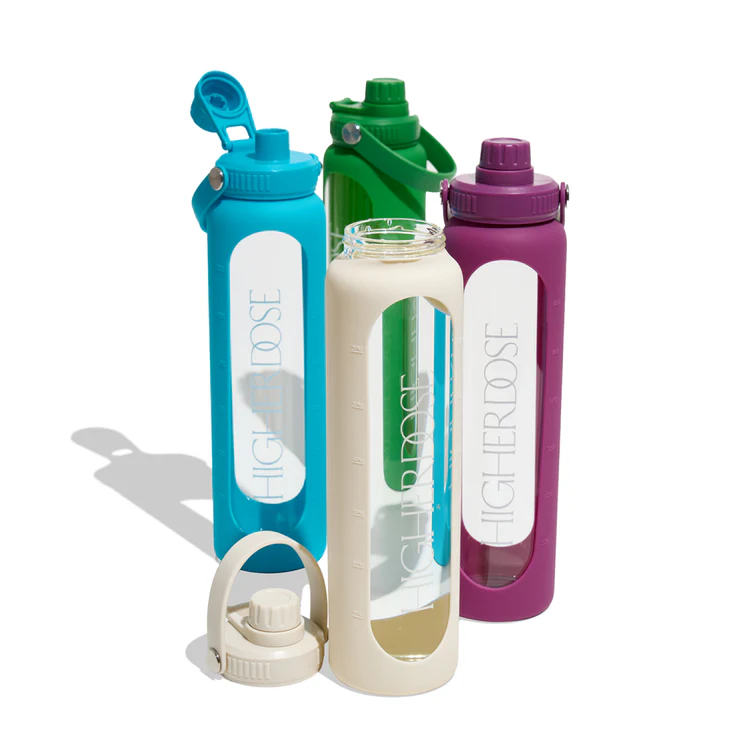
Your Go-To Bottle for Optimal Hydration
We love the DailyDOSE Time-Marked Glass Water Bottle from HigherDOSE because it is simple, stylish, and practical.
🔹 Hourly time markers (8 AM–7 PM) keep you on track with your water intake.
🔹 Made from durable, heat-safe borosilicate glass, safe for hot liquids and sauna use.
🔹 Comes with a soft silicone sleeve for protection and grip.
🔹 Features a BPA-free sports cap for easy sipping on the go.
🔹 Dishwasher safe and includes a silicone cleaning brush for easy care.
🔹 Holds 1 liter. Perfect for sauna, sauna blanket, PEMF mat sessions, or all-day hydration.
$39 at HigherDOSE
Cooling Coda Post-Sauna
After your sauna session, repairing your body is important because you lose vital electrolytes through sweat. Here are some options:
🔹 Water: Nothing beats plain water for hydration. Drink plenty alongside any other beverage to rehydrate effectively.
🔹 Coconut Water: A natural source of electrolytes, making it a strong choice.
🔹 Herbal Teas: Chamomile and peppermint calm the body and add hydration after heat exposure.
🔹 Fruit Juices: Choose 100% juice with no added sugars for hydration and vitamins. Juices from oranges and tomatoes are good sources of potassium.

🔹 Sports drinks replace electrolytes like sodium and potassium lost through sweat. While effective for replacing electrolytes after intense sweating, sports drinks are generally unnecessary for most sauna sessions unless sweating is exceptionally prolonged or heavy [6]. For casual use, lower-sugar options like coconut water are often preferred
🔹 Milk, especially chocolate milk, provides electrolytes, carbs, and protein for recovery. Opt for low-sugar options to keep blood sugar stable.
🔹 Coconut & Pineapple Blend: A tropical drink that replenishes electrolytes and soothes the body with its enzymes. 👉 Coconut & Pineapple Blend recipe
🔹 Protein-Packed Chocolate Almond Shake: Helps rebuild muscles after your session. 👉 Protein-Packed Chocolate Almond Shake recipe
🔹 Cherry Berry Antioxidant Blast: A sweet, antioxidant-rich drink to combat oxidative stress post-sauna. 👉 Cherry Berry Antioxidant Blast recipe

🔹 Smoothie Solutions: A nutrient-rich smoothie aids rehydration and recovery. Use leafy greens like spinach or kale with fruits such as bananas or berries for vitamins and potassium. Adding cucumbers and celery increases hydration. Including yogurt, milk, or nut butters provides electrolytes like calcium and magnesium. 👉 Smoothie recipes
Ready-to-go option
If you’re short on time or need a dependable way to restore minerals after sweating, High-Dration Powder works well. It contains a full range of electrolytes to replace what’s lost during sauna sessions or heavy sweating, helping maintain hydration, focus, and performance.
One box includes 30 single-serving pouches with Magnesium Citrate, Watermelon Fruit Powder, Calcium Citrate, Zinc, Sodium Chloride, Potassium Citrate, Fiber, Vitamin C, Himalayan Pink Sea Salt, and Red Marine Algae Mineral Powder.
$39 at HigherDOSE
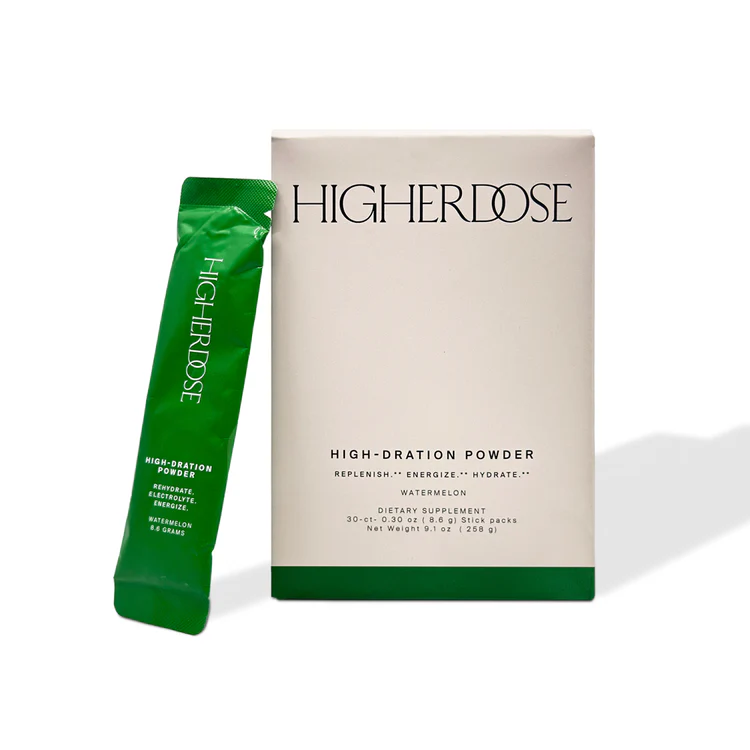
Saunace is supported by its audience. When you purchase through links on our website, we may earn an affiliate commission. Find our affiliate policy here.
That wraps it up. These are some of the best drink choices for post-sauna recovery. After infrared sessions, skip sugary drinks that spike blood sugar. Go for something simple: protein and carbs to help replenish what you’ve lost. Don’t forget to keep hydrating throughout your recovery.
Step-by-Step Sauna Hydration Protocol
Here’s a hydration timeline to help you get the most from your session:
🔹 Pre-Sauna (2 hours before)
Drink 16 oz* herbal tea or coconut water to prep your system.
🔹 In-Sauna (During your session)
Sip 4–8 oz water or fruit-infused water every 15 minutes.
🔹 Post-Sauna (Right after)
Replenish with 16 oz of an electrolyte drink or coconut water.
🔹 Recovery (Within 2 hours)
Follow with 16–24 oz of a mineral-rich fluid to fully rehydrate.
*16 oz is roughly two glasses, or 475 ml
Kick off with the best drink for sauna picks and hydration tips to fuel your session. Staying properly hydrated throughout helps your body recover and function well.
Saunace.com publishes reviews and usage guides for infrared and PEMF devices to help readers compare options and use them safely; see the About page to learn how we research and evaluate products.

Diane Sargent
Updated: August 2025
Seeking further sauna insights? Continue your journey with these posts
References:
1. Cleveland Clinic. (n.d.). Electrolytes. Retrieved July 30, 2025, from https://my.clevelandclinic.org/health/diagnostics/21790-electrolytes
2. Shirreffs SM, Sawka MN. Fluid and electrolyte needs for training, competition, and recovery. J Sports Sci. 2011;29 Suppl 1:S39-46. https://pubmed.ncbi.nlm.nih.gov/22150427/
3. WebMD, Health Benefits of Coconut Water, https://www.webmd.com/diet/health-benefits-coconut-water
4. Prasad S, Aggarwal BB. Turmeric, the Golden Spice: From Traditional Medicine to Modern Medicine. In: Benzie IFF, Wachtel-Galor S, editors. Herbal Medicine: Biomolecular and Clinical Aspects. 2nd edition. Boca Raton (FL): CRC Press/Taylor & Francis; 2011. Chapter 13. Available from: https://www.ncbi.nlm.nih.gov/books/NBK92752/
5. Kim ST, Pressman P, Clemens R, Moore A, Hamilton R, Hayes AW. The absence of genotoxicity of Aloe vera beverages: A review of the literature. Food Chem Toxicol. 2023 Apr;174:113628. https://pubmed.ncbi.nlm.nih.gov/36702364/
6. Patton, J. (2023). Are electrolyte drinks beneficial or not? Cleveland Clinic Health Essentials. https://health.clevelandclinic.org/electrolyte-drinks-beneficial-or-not
